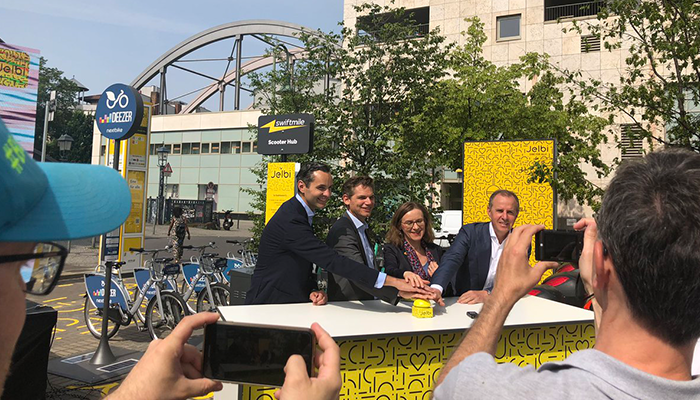Trafi & BVG’s All-in-One Mobility App Jelbi Goes Live in Berlin

Trafi, the technology platform for mobility solutions, and Berliner Verkehrsbetriebe (BVG), the main public transport company in Berlin, are today launching a pilot version of Jelbi, the first mobility app to connect all different types of transport in the city. The mobility service is a one-stop shop for people travelling in Berlin, making it easy to plan and purchase all your trips in the same place.
Users can say goodbye to app-jumping, difficulties finding a convenient route and tiresome registration processes. With Jelbi, you only need to register once to access the full range of mobility in Berlin. Planning, booking and buying your trip is all part of the app, and you don’t have to sign up with any additional companies. Instead, we keep all your trips and tickets in one place.
Jelbi is the first mobility service in the world with so many deeply integrated transportation providers, and it will be available on both iOS and Android. The pilot phase is starting today, on the 11th of June 2019, and already offers people the opportunity to use the entire public transit system as well as Nextbike (bike sharing), Emmy (e-scooter sharing), and Miles (car sharing) seamlessly within Jelbi.
Later this summer follows BerlKönig (ride-sharing shuttles), a joint effort from BVG and ViaVan. Shortly thereafter Taxi Berlin should be fully integrated and after the approval of e-kick scooters, Tier will be next in line. In the future, other mobility modes will be added gradually and the list is long - around 25 transport providers have already expressed their interest in joining Jelbi.
“Jelbi is the largest partnership between a public company like BVG, and a private partner like Trafi, that we have seen across the globe. We are incredibly proud to launch Jelbi in a record time, bringing innovative technology to the streets of Berlin and to the hands of every Berliner. Our collaboration is showing how the future of mobility can become a reality in a matter of months, with a strong local network partner and a technology speedboat to pave the way. Kicking off the pilot with a few absolutely integral transport providers, we are so excited for everyone to start using Jelbi”, says Christof Schminke, Managing Director Commercial Hub Berlin at Trafi.
"We invite everyone who wants to experience the future of mobility to join us when we open the pilot version of Jelbi for everyone to use today. As the mobility landscape is changing faster than ever before, we realize that the app will never be completely ready and fully developed - it is and will be an adaptable service for the citizens of Berlin. As we are working on the integration of further partners, we are looking forward to get feedback from our users. Only then can Jelbi become the app that moves us all over Berlin", says Dr. Henrik Haenecke, CFO and CDO at BVG.
Trafi’s ready-to-use technology makes connecting various types of transportation modes effortless. Offering the world’s most advanced mobility software, we make it possible for people, transport operators and cities to connect on one platform. From real-time routing and multimodal solutions, to purchase and ticketing, Trafi provides whitelabel solutions for both private and public companies.
About Trafi
Trafi is the most technologically advanced platform for mobility solutions, powering the world’s leading companies and cities. The technology suite is tailor-made to operate mobility services. From white label MaaS solutions to deep analytics, we enable our partners to become the driving forces of urban mobility. Founded in 2007 with offices in Berlin, Vilnius and London, Trafi is proud to count companies like Lyft, Google, Apple, Volkswagen, Skoda, and cities including Berlin, Jakarta, and Rio de Janeiro amongst our clients.
About BVG
Berlin's public transport company, the Berliner Verkehrsbetriebe (BVG), is the engine that moves Berlin, and has been doing so for 90 years. With its dense network of lines, state-of-the-art vehicles and efficient service, BVG is Germany's largest municipal transport authority. The BVG transport network is made up of ten underground railway lines), 22 tram lines and more than 150 bus lines, as well as six ferries, and provides mobility around the clock, 365 days a year. The employees of BVG operates a fleet of around 3,000 vehicles, serving more than 3.5 million inhabitants across an area that covers some 1,000 square kilometres. More than a billion passengers use the buses and railways operated by the BVG every year.
Back to news